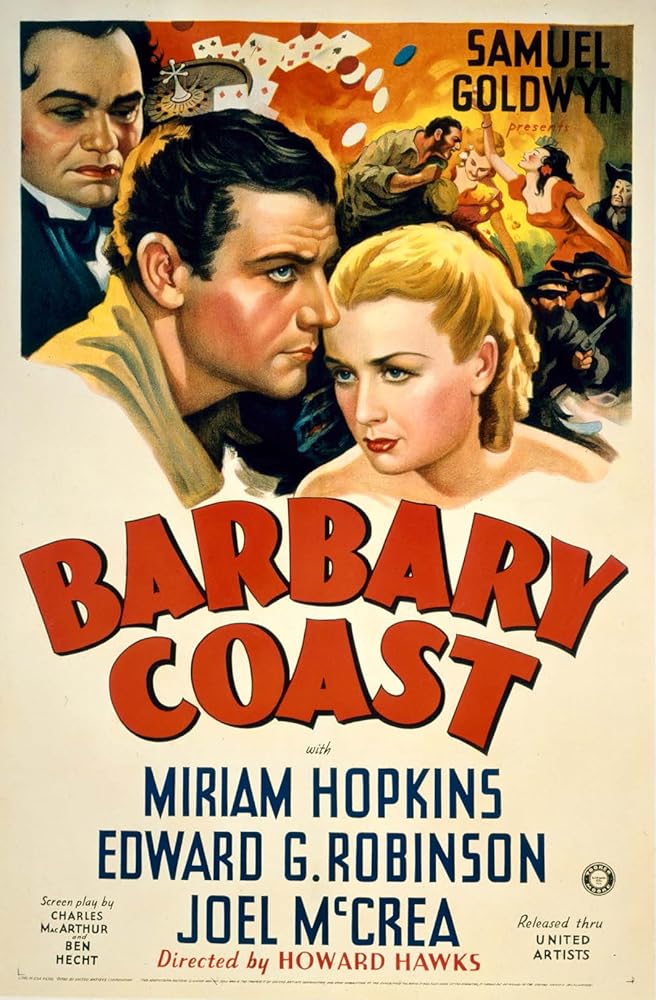
BARBARY COAST
director: Howard Hawks; screenwriters: Charles MacArthur/Ben Hecht; cinematographer: Ray June; editor: Edward Curtiss; music: Alfred Newman; cast: Miriam Hopkins (Mary Rutledge), Edward G Robinson (Louis Chamalis), Joel McCrea (James Carmichael), Walter Brennan (Old Atrocity), Frank Craven (Col. Marcus Aurelius Cobb), Brian Donlevy (Knuckles Jacoby), Clyde Cook (Oakie), Donald Meek (Sawbucks McTavish), Harry Carey (Sheriff Slocum), J. M. Kerrigan (Judge Harper), Fred Vogeding (Captain), David Niven (Cockney Sailor Thrown out of Saloon); Runtime: 90; MPAA Rating: NR; producer: Samuel Goldwyn; United Artists; 1935)
“It’s an entertaining but lesser Hawks film, too conventional in its storytelling to kick up any dust.”
Reviewed by Dennis Schwartz
A juicy romantic drama revolving around a crass sentimentalized love triangle story and a more unnerving tale about the need to be amoral to survive in the rough-and-tumble lawless West. It’s set during the Gold Rush of 1849 in San Francisco, known back then as the Barbary Coast. Producer Samuel Goldwyn came up with the title and told writers Charles MacArthur and Ben Hecht to come up with a screenplay for it. With the talented Howard Hawks (“Twentieth Century”/”To Have and Have Not”/”The Criminal Code”) directing, the result was a mighty fine fantasy Hollywood melodrama replete with colorful nicknames, muddy roads, mist, snappy dialogue and virile characters trying to find out how to act proper around a beautiful but lonely lady to win her heart. It’s an entertaining but lesser Hawks film, too conventional in its storytelling to kick up any dust. But the excellent cast and the foggy atmosphere, give it a notable dark look raising it slightly above its B-film material. This was the film where David Niven made his first appearance in a long acting career as an extra, who is a Cockney sailor thrown out of the saloon.
Warning: spoilers in the next two paragraphs.
Beautiful gold digger mail-order bride Mary Rutledge (Miriam Hopkins) arrives by boat from New York in the San Francisco of 1849 to marry prospector Dan Morgan, who struck a gold mine, only to discover that her would-be meal ticket groom has mysteriously died after losing all his money gambling at the Bella Donna—a saloon owned by the local underworld big shot Louis Chamalis (Edward G Robinson), who runs a crooked roulette wheel and uses his mobster muscle to exert enormous influence in town. The thick-skinned Mary gets work in Chamalis’ saloon as a roulette operator and becomes a kept woman known as the Swan. Louis, in the habit of dressing in frilly shirts and sporting a dangling earring, makes it no secret he’s madly in love with Mary. But she never returns his affection, while coldly taking his money and giving him action the way a prostitute would to her john. Unhappy with her loveless life, Mary unexpectedly falls in love at first sight while walking in a rainstorm and meeting an innocent handsome well-educated prospector from Gramercy Park in New York, Jim Carmichael (Joel McCrea), who has been here for two years prospecting and is returning home with two saddlebags filled with gold. When Jim’s ship home is delayed Old Atrocity (Walter Brennan), a treacherous shill, steers the lovesick fancy talking, Shelley loving, Jim to the Bella Donna where he’s startled to find Mary, whom he had up on a pedestal as an elegant lady, running the wheel and while given a drugged drink by Knuckles (Brian Donlevy), Chamalis’s enforcer, he loses all his gold at the crooked wheel and then gets hired by Chamalis as a waiter so he can earn boat fare home.
The local citizens have had it with Chamalis ruthlessly and crookedly running their town and getting away with having Knuckles murder two Scottish miners as well as Colonel Marcus Aurelius Cobb (Frank Craven), a crusading newspaperman, who had befriended Mary when she first arrived by boat. They have formed a vigilante group led by the sheriff (Harry Carey) and hang Knuckles. Meanwhile Mary lets Jim win back his money at the crooked wheel and they use a rowboat to catch the boat that just left port for New York. They are chased by Chamalis in a rowboat and one his henchmen plugs Jim. The distressed Mary, an unsympathetic figure until now, redeems herself as she promises to love Chamalis like she does Jim if he puts the severely wounded Jim on the boat without her. But Chamalis realizes at last that she can’t love him and puts Jim on the boat with Mary, just as the vigilantes arrive to carry out frontier justice against him.
Hawks would re-team with McCrea, Brennan and producer Goldwyn in “Come and Get It” the following year.
REVIEWED ON 7/13/2008 GRADE: B